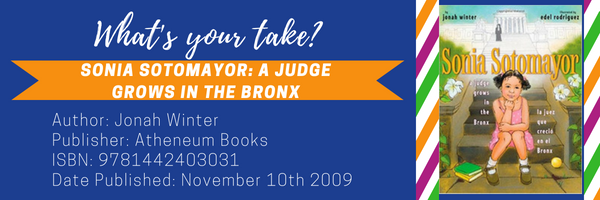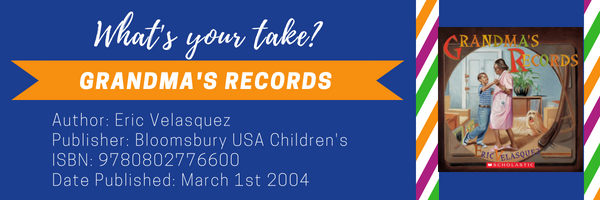Many layers of idiosyncrasies lie within the books that allow readers to explore the cultural complexities of the Puerto Rican experience. This week, My Take/Your Take looks at the role of women in Puerto Rican culture as evident through a contemporary, well-known role model in Sonia Sotomayor: A Judge Grows in the Bronx and a quieter, equally crucial role model in Grandma’s Records.

RENÉ: This week’s books are incredibly evocative because they touch a central nerve within every culture–the role of Puerto Rican women, especially the role of mothers and grandmothers. The mamás (mothers) and the abuelas (grandmothers) are fierce! From childhood I recall female politicians, Puerto Rico Supreme Court judges and other women in positions of power in what was considered an extremely machista culture. That fierce spirit resides in my mother and her mother as well. Here in the middle of rural western Pennsylvania where I live, I constantly confront the, “If mama ain’t happy, nobody’s happy,” mentality that persists in many realms of American culture. I clash with this cultural tenet because the female and male roles in my family relationships are quite equitable even in my grandparents’ lives. The roles of women in my life bring a different perspective and they help define the way I perceive the world. Our mothers and grandmothers consciously and unconsciously mold our characters. They add pieces that end up being part of who we are and who we become.
CHARLENE: I grew up in a male-dominated world prevalent during the 1960s when men controlled the public sphere and women quietly helped organize the private family sphere. How fascinating that your family offers more progressive opportunities for females.
Sonia’s mother, as portrayed by Jonah Winter’s deft narrative, offers an inspirational example of single mothers overcoming a tough existence while living in a housing project. Her determination to find a way out for her daughter and son is a story that needs to be shared widely. Educational opportunities starting with private grade schools coupled with endless hours of studying set Sonia and her brother on a different trajectory.
Sonia Sotomayor is our second book by Winter featuring a Puerto Rican role model. Explorations of both Roberto Clemente and Sonia Sotomayor provide readers with inspirational life lessons filled with determination and courage to overcome differences.
RENÉ: The recounting of Sonia’s life is the story of a Puerto Rican de acá (from here) just like Tito Puente a few weeks ago. She was born in the Bronx and considered herself a Nuyorican–a Puerto Rican descendant born in New York. Sonia’s story is a powerful example of the role of the mother forging paths for herself and her children. Sonia’s story unveils the life of Sonia and her boy brother Juan–now a physician. It also shows the power of education in offering people a track beyond poverty and the lengths a mother takes for the survival of a family in the heart of New York City’s public housing.
CHARLENE: In today’s era with stereotypes and prejudice abound in national conversations, we need time to investigate passionate women like Sonia and her mother Carmen, offering readers counter-narratives. Young readers need time to examine and learn from the lives of strong females. Winter’s book provides a starting point.
I was sad to read about Sonia’s childhood love of Nancy Drew books. I wonder if Winter included this as a quiet way to say, “Hey teachers, share more global books.” Sonia deserves to find stories with characters that represent her world.
Our discussion of Sonia’s family leads us into our second book, Eric Valesquez’s Grandma’s Records. Remember we already met Eric during our discussion of Arturo Schomburg. This book can easily inspire a writing project focused on sharing memories of special moments with grandparents.

RENÉ: Eric’s autobiographical story transports us to the heart-filled moments spent with our abuelas (grandmothers). Abuelas are special! I often relive great moments in my maternal grandmother’s care. The learning opportunities with my Mama Carmen were infinite–from knowing about our ancestors and life during her childhood and hearing funny stories about my mom’s childhood to learning how to play Tute (a Spanish card game). She taught us to use proper Spanish and English pronunciation and execute good manners. You could not deny that she is not only a great abuela, but that she is a great teacher.
Grandma’s Records shares Eric’s vivid memories of summertime spent with his beloved Puerto Rican grandmother, Carmen Maldonado. The story focuses on those special moments which influenced his passion for the arts–especially for music and drawing.
CHARLENE: Eric highlights his grandmother’s role in encouraging his love of music and art in a second book, Grandma’s Gift. Without his grandmother’s influence, would he be the artist he is today?
RENÉ: Grandma’s Records is a stupendous classroom resource for the study of family relationships and their influence on personal identity. It provides opportunities to study our past as we move forward to create our future. This narrative offers a chance to honor those who came before us–parents, grandparents, family members, friends and neighbors–who contributed in vital ways to our development. Children can study these everyday cultural experiences, write about them and make movies for future generations.
Title: Sonia Sotomayor: A Judge Grows in the Bronx
Author: Jonah Winter, illustrated by Edel Rodriguez
Publisher: Atheneum Books for Young Readers
ISBN: 9781442403031
Date Published: November 10, 2009
Title: Grandma’s Records
Author: Eric Valesquez
Publisher: Bloomsbury USA Children’s
ISBN: 9780802776600
Date Published: March 1, 2004
This is the fourth installment of July’s MTYT Series. Last week we discussed the sights and sounds of Puerto Rico in two different picturebooks. Before that, we talked about Roberto Clemente and Tito Puente, and all the way at the beginning of July was a post about Arturo Schomburg. Check back next week to follow the conversation!
- Themes: Charlene Klassen Endrizzi, Edel Rodriguez, Eric Valesquez, Grandma's Records, Jonah Winter, René Picó, Sonia Sotomayor
- Descriptors: Books & Resources, My Take/Your Take
